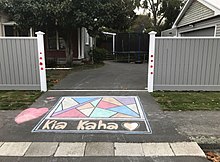
Kia kaha is a Māori phrase used by the people of New Zealand as an affirmation, meaning stay strong. The phrase has significant meaning for Māori: popularised through its usage by the 28th Māori Battalion during World War II, it is found in titles of books and songs, as well as a motto.
Linguistically, "kia kaha" consists of the desiderative verbal particle kia, used here as 'an encouragement to achieve the state named',[1] that is, to achieve kaha or strength. Kaha derives from Proto-Polynesian *kafa, meaning "strong" or "great"; *kafa is also the Proto-Polynesian term for sennit rope (e.g. Hawaiian: ʻaha), a strong rope made from coconut fibres and used for lashing canoes, weapons, and buildings together.[2]
- ^ Winifred Bauer, 1997. The Reed Reference Grammar of Māori. Reed, page 99.
- ^ Baybayan, Chad (2012). "Plants and Tools Used for Building Canoes". Hawaiian Voyaging Traditions. Polynesian Voyaging Society.